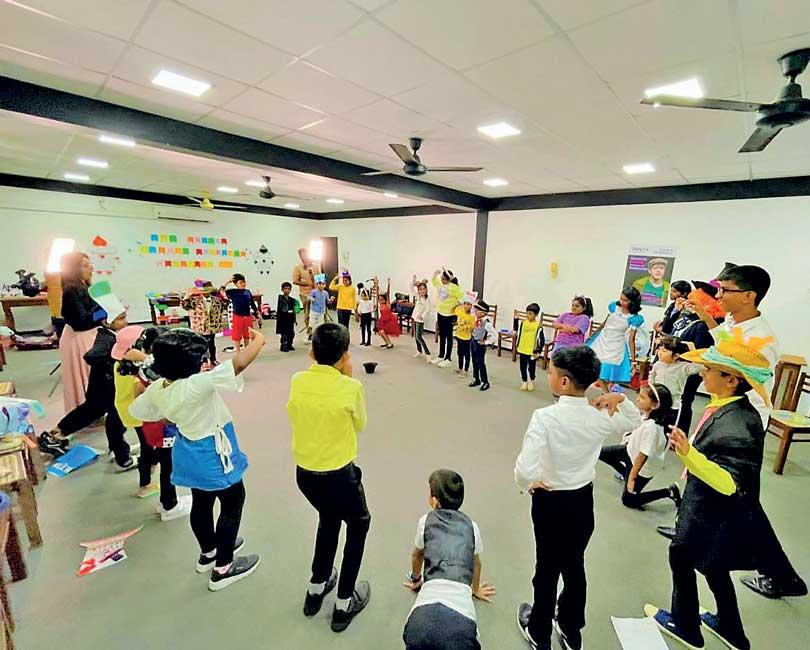

 Picture this: the spotlight warms a nervous child’s face. The curtain quivers. The stage is silent. Then, one line, spoken bravely, sets the whole room alive. It might seem like a small moment, but in truth, that child just unlocked a world of life skills no textbook could ever teach. For decades, drama has been brushed aside as “just acting.” A hobby. An extra. Something nice to have once the “serious subjects” are taken care of. But what if drama was not just play? What if it was the secret laboratory of education, where confidence is engineered, empathy is rehearsed, and resilience is quietly rehearsed behind the scenes? In a world that chases grades, drama is the subject that teaches what exams can’t. And in Sri Lanka, where mental health remains a whispered topic and communication is a lifeline, drama could well be the quiet revolution our schools desperately need.
Picture this: the spotlight warms a nervous child’s face. The curtain quivers. The stage is silent. Then, one line, spoken bravely, sets the whole room alive. It might seem like a small moment, but in truth, that child just unlocked a world of life skills no textbook could ever teach. For decades, drama has been brushed aside as “just acting.” A hobby. An extra. Something nice to have once the “serious subjects” are taken care of. But what if drama was not just play? What if it was the secret laboratory of education, where confidence is engineered, empathy is rehearsed, and resilience is quietly rehearsed behind the scenes? In a world that chases grades, drama is the subject that teaches what exams can’t. And in Sri Lanka, where mental health remains a whispered topic and communication is a lifeline, drama could well be the quiet revolution our schools desperately need.
DRAMA’S HIDDEN SUPERPOWERS
The Brain Gym
Think learning lines is just playacting? Science disagrees. Memorising scripts flexes memory muscles more effectively than most revision guides. Research from the University of Michigan found that drama exercises light up multiple parts of the brain at once; language, motor skills, even emotional regulation. It’s like mental cross-training.
The Stress Rehearsal Room
Forgot your line? Improvise. Missed your cue? Adapt. Every mistake on stage is a rehearsal for life’s curveballs. Where else do children learn to recover from failure without punishment? The stage becomes a safe rehearsal space for resilience, where laughter often replaces shame.
The Empathy Machine
No worksheet can teach empathy. But stepping into a character’s shoes? That’s living it. When a child plays Shylock, Alice, or even a mischievous goblin, they momentarily inhabit another reality. Psychologists call it role-taking, but children simply call it fun. And in that fun, they unknowingly practise compassion.
The Equal Stage
On stage, wealth, class, and background dissolve. The shy student and the “class clown” both matter equally when the curtain rises. Props, costumes, and even the humble chair or mask become levellers. A king’s crown and a beggar’s stick can be worn by anyone. Drama teaches one of the most democratic lessons of all: every voice counts.
The Confidence Compass
Today it’s speaking lines in front of thirty classmates. Tomorrow it’s presenting ideas in front of colleagues, leading a team, or even defending one’s beliefs.
Drama doesn’t just build performers; it rewires nerves into courage. A child who has felt their voice echo through an auditorium will never forget the sound of their own strength.
The Symbolism of the Stage
Theatre has always been more than a floor with curtains. The stage is a metaphor for life itself. Think of the spotlight, it doesn’t shine forever, but when it does, you must step into it bravely. Think of props: a sword, a feather, a paper boat. They are symbols of imagination transforming the ordinary into the extraordinary. Even the mask, one of drama’s oldest tools, is layered with meaning. The comedy and tragedy masks of ancient Greece remind us that life itself swings between laughter and sorrow. For children, slipping on a mask is more than dress-up, it’s permission to explore sides of themselves society might not normally allow.
In Sri Lanka: Why Drama Matters Now
Sri Lanka is a nation that values education deeply. Parents invest, schools compete, and children spend hours chasing grades. Yet ask any employer, and they’ll tell you: technical knowledge is not enough. What’s needed are soft skills; communication, problem-solving, creativity, teamwork, adaptability. Drama is the hidden key to all of these. In a society where speaking up can feel risky, drama gently coaches children to find their voice. Where conformity often trumps individuality, drama declares: every story matters. And here lies something even more powerful: healing. In a country still learning to speak about its wounds, be they personal, cultural, or historical; drama offers a non-threatening space. A stage where children can express grief, joy, fear, or hope without judgment. It is therapy disguised as play.
Fun Facts Parents and Kids Will Love
Shakespeare invented over 1,700 words we still use today. Every time children act his plays, they connect with the very roots of English creativity. Ancient Greeks believed drama could “purify the soul” through catharsis. In other words, a good cry or hearty laugh on stage was considered essential to mental health. Even NASA uses improvisation techniques from drama to train astronauts for unexpected scenarios in space Studies in the UK show children involved in drama score higher in problem-solving tasks and show greater empathy towards classmates.
A Drama Lesson in Action
Step inside a drama classroom and you’ll see transformations no textbook can script.
- The hesitant child learns the cadence of confidence by reading a single line aloud.
- The anxious child discovers the balm of laughter when their “mistake” sparks applause.
- The restless child channels chaos into creation, sculpting wild energy into art.
Each improvised scene becomes a small act of liberation: a chance to argue without malice, to fail without consequence, to inhabit lives beyond one’s own. Props, too, come alive. A chair becomes a throne, then a prison, then a rocket ship; all within minutes. Through this magic, children learn one of life’s most vital lessons: reality is flexible, and imagination is power.
Not Just About Actors
Parents sometimes worry: “But my child isn’t going to be an actor.” That’s precisely the point. Drama is not about creating performers for the stage. It’s about equipping children for the stage of life. The boardroom needs leaders who can persuade. Hospitals need doctors who can listen. Classrooms need teachers who can inspire. Every profession needs humans who can connect. Drama simply builds them early.
A Call to Re-Imagine Education
So, why do we still call drama an “extra subject?” Why do we relegate it to the shadows of mathematics and science when it is in fact their equal? Mathematics may teach logic, but drama teaches humanity. Science may explain the world, but drama helps us live in it. Drama is not a distraction. It is a lifeline. It is discipline disguised as play, resilience rehearsed as entertainment, and therapy woven into performance. In a society that often prizes silence over expression and conformity over individuality, drama is the bold declaration: every story matters. Perhaps, in this island still finding the courage to speak openly, drama could be the voice of healing we never knew we had.
Curtain Call
When the final bow is taken and the lights dim, the lesson of drama does not end. It follows children into classrooms, boardrooms, and living rooms. It reminds them that mistakes are recoverable, that courage can be rehearsed, and that empathy is best lived, not lectured. Maybe it’s time we stopped asking whether drama belongs in our schools. Maybe the better question is: how could we ever imagine school without it? Because in the end, education is not only about producing professionals. It’s about producing great humans. And if every child is the hero of their own story, then drama is the rehearsal space for a better tomorrow. After all, life itself is the greatest stage, and drama, perhaps, its most essential rehearsal.










